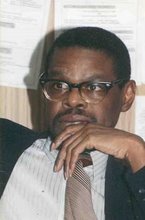Tuesday, May 01, 2007
Nothing is more important than to hear the voice of youth, asking questions and seeking legitimate answers. Student members of the UTA NAACP submitted some questions for me to reflect on for the May 1st Town Hall Meeting. (See Information below)
This is especially interesting because it follows a national agenda created by Tavis Smiley’s Covenant with Black America and preludes the TV broadcaster’s June 28, 2007 Democratic Presidential Forum to be aired in primetime on PBS.
QUESTION 1
Of Black 16 –to 24 year olds, 13 percent have not earned a high school diploma or GED, furthermore the approximate national high school graduation rate for African Americans is 55 percent, what do you believe are the major factors causing this lack of achievement.
QUESTION 2
In 2000, 31 percent of African Americans ages 18 to 24 were enrolled in colleges and universities; What major factors do you believe contribute to the lack of motivation or the prevention of African Americans in pursuing higher education.
QUESTION 3
Statistics show that the national retention rate for black college students is only 40%, how does the public education system contribute to this statistic. Further, what other factors contribute to this statistic.
QUESTION 4
There is a reality that in black communities many parents often enter black youth in pee wee sports leagues and celebrate them for those accomplishments. Moreover, black parents encourage youth to pursuit sports throughout grade school. Unfortunately, many of these black parents don’t enroll them in extracurricular empowerment programs that are either academic or mentally enhancing in nature. Why do we hold community parades for our High School sports championships but not for a debate team championship? How does this influence from Black parents affect our youth’s values towards education?
QUESTION 5
How does the lack of Education connect to the lack of economic and political power for Black America?
QUESTION 6
Of the 31 percent of African Americans enrolled in colleges and universities, nearly two-thirds of them are females. What are the contributing factors to the prevention or lack of motivation for African American males to pursuit higher education?
QUESTION 7
In a national assessment of student reading ability, black children scored 16 percent below white children. Furthermore, just 12 percent of African-American 4th graders have reached proficient or advanced reading levels, while 61 percent have yet to reach the basic level. What roles do parents, public education and the community have in these statistics and what can each do to improve them?
QUESTION 8
What policies and/or programs do you feel should be implemented to ensure that students receive an education that equips them with the knowledge and preparedness for the next level education and life?
QUESTION 9
How do you feel the low compensation structure for teachers in public education contribute to the quality of education given to black students? Furthermore, how do you feel the lack of cultural sensitivity training affects the education of black children?
QUESTION 10
What steps can black leaders take pressure the government to provide more federal support at all levels of Education, such as more early childhood education programs and more grant money for higher education?
QUESTION 11
While, African Americans make up 13 percent of our population, they occupy less than 4 percent of elected offices in the United States. What factors do you believe contribute to this disproportionate statistic?
QUESTION 12
More than one million African American men, or 13 percent, have currently or permanently lost their right to vote as a result of a felony conviction—seven times the national average. How important is it to reform local laws that restrict ex-felons from voting.
QUESTION 13
It is said that many young black youth are apathetic towards voting and political issues in general, even when they directly affect them. What role do parents play in affecting these values?
QUESTION 14
What steps do you believe young black leaders, specifically between the ages of 18-25, take to promote the importance of voting to youth and peers. Is the Hip Hop community the most effective and influential voice to promote voter activity and education?
QUESTION 15
What roles should our religious institutions play in voter education?
QUESTION 16
If Black America does not progress in the areas of voter education and activity, what do you foresee as the future ramifications?
QUESTION 17
What role does history still play in Black America in regards to voter education and activity?
QUESTION 18
How do you feel the United States government’s political focus on foreign policy affects the state of Black America (i.e. Hurricane Katrina)? Furthermore, how can Black America’s increased focus on voter education and activity change it?
QUESTION 19
On a national level, while there are 435 members of the U.S. House of Representatives, only 42 of them are black; the U.S. Senate is composed of 100 Legislators, with only one being African American. How important do you feel it is to Black America’s political power and equal opportunity to encourage more young black leaders to pursue political careers? Further, do you feel it is the only way that Black America will ever gain equality and political power?
QUESTION 20
As an African American candidate for President, what strategies do you believe Barack Obama should utilize to win the Presidency. Furthermore, if he is elected President, what critical issue in Black America should he address first?
Town Hall Meeting
University of Texas at Arlington
701 S. Nedderman Drive
Arlington , Texas
Time: 7:00 PM
Contact for Additional Information
Junichi Lockett, UTA Political Action Chair
(817)333-4458
Reference: “Why Vote and Nothing Changes?”
Tuesday, May 1, 2007
Subscribe to:
Post Comments (Atom)





No comments:
Post a Comment